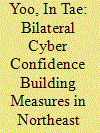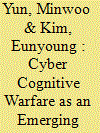|
|
|
Sort Order |
|
|
|
Items / Page
|
|
|
|
|
|
|
| Srl | Item |
| 1 |
ID:
188865


|
|
|
|
|
| Summary/Abstract |
Under what conditions do countries form confidence building measures (CBMs)
in the cyber domain? How do those conditions affect the frequency and type of
cyber CBMs (CCBMs)? The extant literature surveys existing CCBMs, providing
fragmented pictures of them at either the global, regional, or bilateral levels.
Thus, there is a lack of systematically comparative perspectives between multiple
efforts for states’ cyber confidence–building. This deficiency implies that little
to no research has been dedicated to analytical examinations of the development
of CCBMs. The present article offers a framework to assess the development
and theoretical arguments to understand its underlying causes. It argues that the
willingness of political leaders affected by the international strategic–security
context is a necessary condition, in addition to the cost-benefit calculation of
policymakers, affecting the frequency and type of CCBMs. To examine the
arguments, the present article overviews the global development of the discussion
of CCBMs at the UNGGE and OEWG. Then it presents the networks of CCBMs
in Northeast Asia where the staunchest alliances as well as fierce strategic–security
competitions have taken hold in the emergence of the new cyber domain. Lastly,
the article investigates the processes of bilateral CCBMs formation in three dyads
between the United States and each of three states, namely, Russia, China, and
Japan. The empirical findings support the theoretical arguments
|
|
|
|
|
|
|
|
|
|
|
|
|
|
|
|
| 2 |
ID:
188864


|
|
|
|
|
| Summary/Abstract |
Cognitive warfare has become the crucial war domain that determines the outcome
of modern wars. Joseph Nye pointed out, “in today’s war, it is not whose army
wins, but whose story wins,” emphasizing the importance of narratives to occupy
human minds and hearts. This has been repeatedly observed in the “War on Terror”
in Afghanistan and Iraq–Syria and the Russia–Ukraine war in 2014 and 2022.
The strategic importance of winning human cognition by the use of non-kinetic
influence operation had been similarly emphasized in the propositions of fifthgeneration warfare and Gerasimov’s suggestions. By recognizing the importance of
cognitive warfare, this paper attempts to address the concept of cognitive warfare
and suggest strategic and tactical principles for its practical operation and use.
The concept of cognitive warfare is still ambiguous, blurring together with related
concepts such as psychological warfare, information warfare, cyberwar, active
measures, and Reflexive Control. Besides, the substantial conceptual differences
between the U.S.–West and Russia have added more confusion. Thus, some
clarification to distinguish the concept of cognitive warfare from other related
terms seems necessary. Meanwhile, neither has there been any concrete proposition
of how cognitive warfare works strategically and tactically. The literature and
earlier reports only introduced various specific effects and techniques of cognitive
operations. Nevertheless, how these effects and techniques are strategically–
tactically integrated and jointly applied for a cohesive cognitive military operation
is yet to be proposed. This paper responds to two such issues of cognitive warfare.
In future warfare, the weight of cognitive warfare is anticipated to increase further.
Hopefully, this paper will be a stepping stone to rouse interest in cognitive warfare
and the development of its strategies and tactics.
|
|
|
|
|
|
|
|
|
|
|
|
|
|
|
|
| 3 |
ID:
188860


|
|
|
|
|
| Summary/Abstract |
The purpose of this study is to examine the correlation between changes in
North Korea’s foreign policy stance and the citation frequencies of the previous
generations’ discourse in the state–run media, based on the theoretical framework
of strategic culture. As the methodologically most parsimonious and conspicuous
means, this study selected Kim Il Sung’s memoir, With the Century, for the key
text of the country’s strategic culture by referring to previous research; investigated
Rodong Sinmun’s citation frequencies of the memoir; and derived a relation between
the number of citations and the country’s annual nuclear and missile activities. Two
variables’ Pearson correlation coefficient (r) was .88 during the second half of Kim
Jong Un’s reign (2016–2020), allowing notable comparison with the coefficient of
–.41 in the first half of the regime (2011–2015). The significant positive correlation
suggests the possibility that Pyongyang has internalized a specific foreign policy
perception frame since 2016, which includes maintaining a hanging-tough posture
as a default from the previous generations, and entering into negotiations or
dialogue defying the conventional wisdom. This logic may serve as a background
element of resilience that makes the country return to the hardline attitude upon the
occurrence of any slight change in situations.
|
|
|
|
|
|
|
|
|
|
|
|
|
|
|
|
| 4 |
ID:
188862


|
|
|
|
|
| Summary/Abstract |
Sino–Russian relations evidently present a puzzle or quandary to foreign observers.
In the wake of Russia’s aggression against Ukraine, China has opted decisively
to offer Russia limited but substantial political and informational support. But it
has continued joint drills and exercises with Russia. The argument presented here
states initial that despite an equivocation, these actions reveal that this relationship
amounts to a de facto alliance of the two governments. The article begins with an
analysis of China’s reaction to the war in Ukraine, proceeds to discuss the issue of
the nature of this relationship and the view that it is an alliance, and then proceeds to
discuss the benefits of this alliance to both sides in regard to their defense industrial
sectors and for China in regard to Taiwan.
|
|
|
|
|
|
|
|
|
|
|
|
|
|
|
|
| 5 |
ID:
188861


|
|
|
|
|
| Summary/Abstract |
This preliminary study focuses on the change in the regional security order caused
by the U.S.–China competition and its impact on South Korea–Japan relations. The
ongoing U.S.–China relations has expanded beyond the discussion of cooperation
and competition between existing and emerging powers, as well as the debate
over the influence and resilience of the U.S.-led liberal international order. The
significance of the U.S.–China competition in the security order in East Asia
depends on whether China will accept the existing U.S.-led bilateral alliance system
and take a status quo attitude. As a result, the U.S. allies, South Korea and Japan,
need to respond sensitively to the changing nature of the security order. In this vein,
this study explains the East Asian security order as elements of power structure,
institutions, and actors. In addition, it explains the emergence of China as a new
hegemonic power due to the U.S.–China competition, the hub-and-spokes system
changes according to the U.S. rebalancing policy, and the emergence of Trumpism.
Through this, the author argues two claims. First, the change in U.S.–China
relations has led to different expectations between Seoul and Tokyo for cooperation
with the U.S., which has hindered bilateral cooperation between them. Second,
divergent views on China also hinder South Korea–Japan cooperation. Through
the Senkaku dispute between Japan and China and the missile deployment dispute
between South Korea and China, the two countries later showed different directions
in their policy toward China. In the current competitive situation, restrictions on
South Korea–Japan relations are inevitable. However, if the opportunity to promote
security cooperation between South Korea and Japan is sought, it will be able to
show the cooperation of middle power countries that can develop the security order
to mitigate the intensity of U.S.–China competition.
|
|
|
|
|
|
|
|
|
|
|
|
|
|
|
|
| 6 |
ID:
188863


|
|
|
|
|
| Summary/Abstract |
The Taiwan Strait poses a risk of war at any time due to a combination of
international political factors such as China’s national strength, willingness to
unify, Taiwan’s independence, and the U.S.–China leadership competition. In
this situation, this paper analyzed the scenario of China’s invasion of Taiwan, and
considered the comparison of military power on both sides and the direction of
Taiwan’s military power construction. In conclusion, the war in the Taiwan Strait is
likely to trigger geopolitical conflicts between the United States and North Korea on
the Korean Peninsula, and the ROK will have to respond to diplomatic and security
challenges simultaneously. Therefore, we must face up to the fact that tensions and
crises between the two sides in the Taiwan Strait are directly linked to the security
crisis on the Korean Peninsula. It is necessary to closely monitor the conflict
between the two sides and preemptively prepare diplomatic and security response
strategies for each situation.
|
|
|
|
|
|
|
|
|
|
|
|
|
|
|
|
|
|
|
|
|